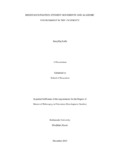
Please use this identifier to cite or link to this item:
https://hdl.handle.net/20.500.14301/251| Title: | RESISTANCE POLITICS: STUDENT MOVEMENTS AND ACADEMIC ENVIRONMENT IN THE UNIVERSITY |
| Authors: | Kafle, Suraj Raj |
| Citation: | Kafle,S.R.(2013).Resistance politics: Student movements and academic environment in the university. |
| Issue Date: | Dec-2013 |
| School: | SOED |
| Department: | DODE |
| Level: | Masters |
| Program: | KUMSD |
| Abstract: | Student movement is a relatively ignored area in academic research. Between the 1960s and 70s, some authors have contributed to this topic in the context of South America and Africa. In 1968, Altbach contributed on Indian student movements. In South East Asia, universities have been experiencing a high volume of norms and values based students' movements from its history of establishment. In the Nepalese context, academic contributions to the understanding of student resistance politics and its effects on the university academic environment are scarce. In this research, I have explored the various issues raised by students’ movements in Nepal in a historical perspective and described its effects on academic environment. My approach has been critical as I have interpreted the historical and current documents utilizing power theory, and critical thought like structuration and social movement theory. I have not been rigid with any particular theory as the research has multi-dimensional perspectives. Each theory has sub-ordinate role which has helped enlighten my level of understanding. ii Methodologically, I have followed the interpretive paradigm, looking at the matter wearing subjective glass having multiple realities, individual subjective response and value system. The method applied is historical in which I have reviewed literature in systematic and rigorous way the accounts of the past and trailed with eye witnesses’ like academicians and role players like student leaders and party leaders in different student movements at different junctures of history. Systematic and rigorous literature reviews and in-depth interviews and focus group discussions have revealed that student movements were not solely associated for the professional rights of the students but the political rights of the citizens. Political issues had been given more priority and political actors as catalysts through political institutions intentionally and strategically. Concentrating on the history of political parties, they have repeatedly pressed their student wings to intensify political activities for making the environment conducive for democratic movements. It can be said that student organizations were concentrated on value based movements before 2046 B.S. as they had struggled throughout their history for political and social rights of the citizens and less contribution to academic movements, whereas after the re-establishment of democracy the movements should be norms based but they were neither committed to norms nor value-based. However, after the royal take over in 2059 B.S., their movement regenerated as value based movement. Student’s organizations had mainly two tasks: one, to raise professional issues, and two, to fulfill the political ambitions of their mother political parties. Ideologically they had to fulfill their deep thirst of political interests, as a result of which they were, knowingly or unknowingly, building their organizations utilizing university and colleges grounds. During this process, there were many faulty iii procedures applied, such as padlocking and arson, burning tires in front of colleges, hooliganism, highhandedness, murder, and violent clashes with opponents in the college premises, which had negative effects on students’ individual careers and academic performance. Examination of issues raised by student movements during different historical periods has multifold contribution to the body of knowledge. It has implications to undertake precautions to stop further deterioration of our academic institutions by the probable student movements of similar or different types in future. In addition, higher education scholars and policy-makers will have a better understanding of what students’ leaders and overall students’ organizations gain from their roles as norms based actors besides value based. Finally, Student movements have a long and rich history in Nepalese higher education sector and will continue to have a place in our institutions of higher learning. |
| URI: | https://hdl.handle.net/20.500.14301/251 |
| Appears in Collections: | Research Project |
Files in This Item:
| File | Description | Size | Format | |
|---|---|---|---|---|
| Suraj Kafle_Mphil. thesis final KU4.pdf | 1.09 MB | Adobe PDF |  View/Open |
Items in DSpace are protected by copyright, with all rights reserved, unless otherwise indicated.